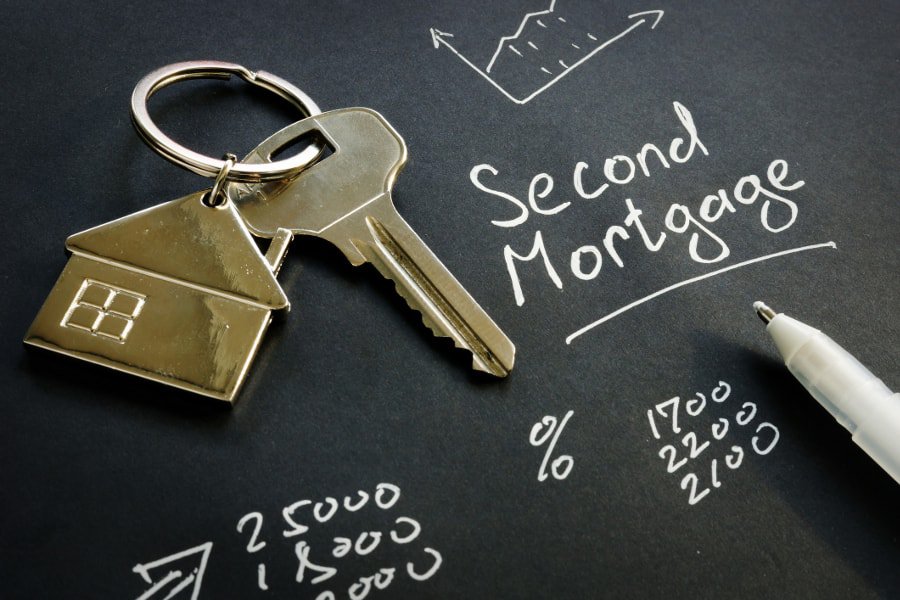How does a second mortgage work?

When would someone need a second mortgage?
You may have heard of the term “second mortgage” in passing before. Although it is obviously not as commonly used as a primary mortgage, which is what you would get when you first buy a new home, there could be a solid strategic rationale behind obtaining a second mortgage. We will get into this later on in this article. For now, let’s start with the definition.
What is a Second Mortgage?
A second mortgage is a new loan on a property that is already mortgaged. This second mortgage gets its name from the fact that it is taken out while the first mortgage is still in the process of being paid off. A second mortgage goes in second position after a primary mortgage that is typically held by a bank or credit union, an alternative lending institution, or another private mortgage lender. Second mortgages are generally offered from private lenders as opposed to more traditional mainstream institutional lenders such as banks or credit unions.
The Mechanics of a Second Mortgage
The question then arises: how does a second mortgage work? The short answer is that it depends on the amount of equity in the home. For example, if your home is worth $500,000 based on its latest appraisal value and you still have $200,000 remaining to be paid off on your primary mortgage, that means you have built up equity of $300,000. One final caveat to add here is that the combined value of your first and second mortgage can usually only be 75% to 80% of your total house value (in technical terms, this implies an 75% to 80% loan to value (LTV) ratio).
Crunching the numbers, 80% of $500,000 is equal to $400,000. Remember you still have $200,000 outstanding on your first mortgage. Hence, your second mortgage can be an additional $200,000 (i.e. $400,000 - $200,000).
Qualification Process
In your primary mortgage, the qualification process involves income verification, credit scores, and a whole bunch of other items that are essentially used to evaluate your creditworthiness. In the case of applying for a second mortgage, these factors are not as important, since private second mortgage lenders place the most importance on the amount of equity that is available in your home. That being said, your mortgage broker should analyze your income to ensure that the mortgage they are brokering for you will not likely cause you to go into default on your mortgage. As such, it is important to understand what can impact the value of equity in the home:
(i) The simplest way to build equity is to make your monthly mortgage payments on your current first mortgage on time. When each payment is made, your mortgage balance is reduced, leaving you with a progressively higher equity balance over time.
(ii) A stronger real estate market can increase the value of your home. However, this is largely out of your control as an individual real estate owner.
(iii) A weaker real estate market can decrease the value of your home. This is also out of your control as it is a direct function of supply and demand in the market, and other economic factors.
Repayment
The term for a second mortgage is typically a year, and in some cases it can be as short as 6 months or as long as two years. In this period, you only pay interest. At the end of the term, you have to either pay back the total in a lump sum amount, extend the loan for another term or take out a new second mortgage to repay it. With a second mortgage, since your payments are interest only, you do not end up paying down the principal balance of the loan. Therefore, unlike a traditional amortized mortgage, you are not building equity in your home with each monthly payment.
Collateral
As with a regular mortgage, the collateral for a second mortgage is the property. However, unlike a regular mortgage, the second mortgage is not immediately paid out in the event of a foreclosure or power of sale. When a house is put into a power of sale or foreclosure, the primary mortgage is paid out first in full before the remaining proceeds are paid out to the secondary mortgage lender. As such, secondary mortgage lenders take on more risk than the primary mortgage lender and therefore charges a higher interest rates along with additional lender fees.
Uses
A second mortgage technically has no restrictions on how it is used (usually). However, borrowers are advised to be prudent in their utilization of those funds. A common use for a second mortgage is a debt consolidation loan. This refers to a lump sump payment that you receive (from the second mortgage funds) to pay off higher-interest loans such as student loans or credit card bills. You then pay off the second mortgage when you can, accruing less in interest payments than if you were to continue paying down the balance on those high-interest credit cards. Some of the other common uses are:
- Tuition for your children’s education
- Down payment towards purchasing another property
- Other higher yielding investments
- Funding your business
- Medical expenses
Advantages of a Second Mortgage
Before taking out a second mortgage, you should be cognizant of its benefits and drawbacks. Some of the main advantages of a second mortgage include:
1) Amount
Second mortgages can allow the borrower to borrow large sums of money that ordinary personal loans may not be able to. This is because they are secured against a larger asset like a house or other such property, contrary to ordinary personal loans which are often unsecured or secured with smaller assets such as a car.
2) Rates
Due to their secured nature, second mortgages are still cheaper than a lot of other debt facilities despite being more expensive than a primary mortgage. This can enable borrowers to take out a second mortgage at a lower rate and pay off credit cards or other bills that accrue interest at a much higher rate.
3) Cost savings
When taking out a second mortgage, you do not have to discharge the first mortgage, thereby saving you from paying out any penalties or fees. And of course the interest you can save when paying off your credit cards in one shot
Disadvantages of a Second Mortgage
1) Higher rate
As noted above, a second mortgage does come at a price. Because second mortgage lenders take on more risk than primary mortgage lenders, they have to be compensated for this risk with a higher interest rate and a lender fee that is charged to the borrower.
2) Risk of power of sale
Your home is again on the line. If payments are stopped, then the second mortgage lender can take over the primary mortgage and put the home into power of sale. It is for that reason that second mortgages are ordinarily used to fund something with future benefits (e.g. an education) rather than a vacation or other discretionary expense. For short-term consumption such as that, most borrowers find that it is simply not worth the risk of losing their home.
Ultimately, the pros and cons of a second mortgage have to be weighed against each other to make sure that it is the right choice for you based on your individual financial situation and goals. A second mortgage is a great way to tap into a large sum of equity on a relatively short timeline, but there is also downside risk involved. To ensure that you are making the right decisions, contact a trusted mortgage broker to help you guide you through the decision and process.





